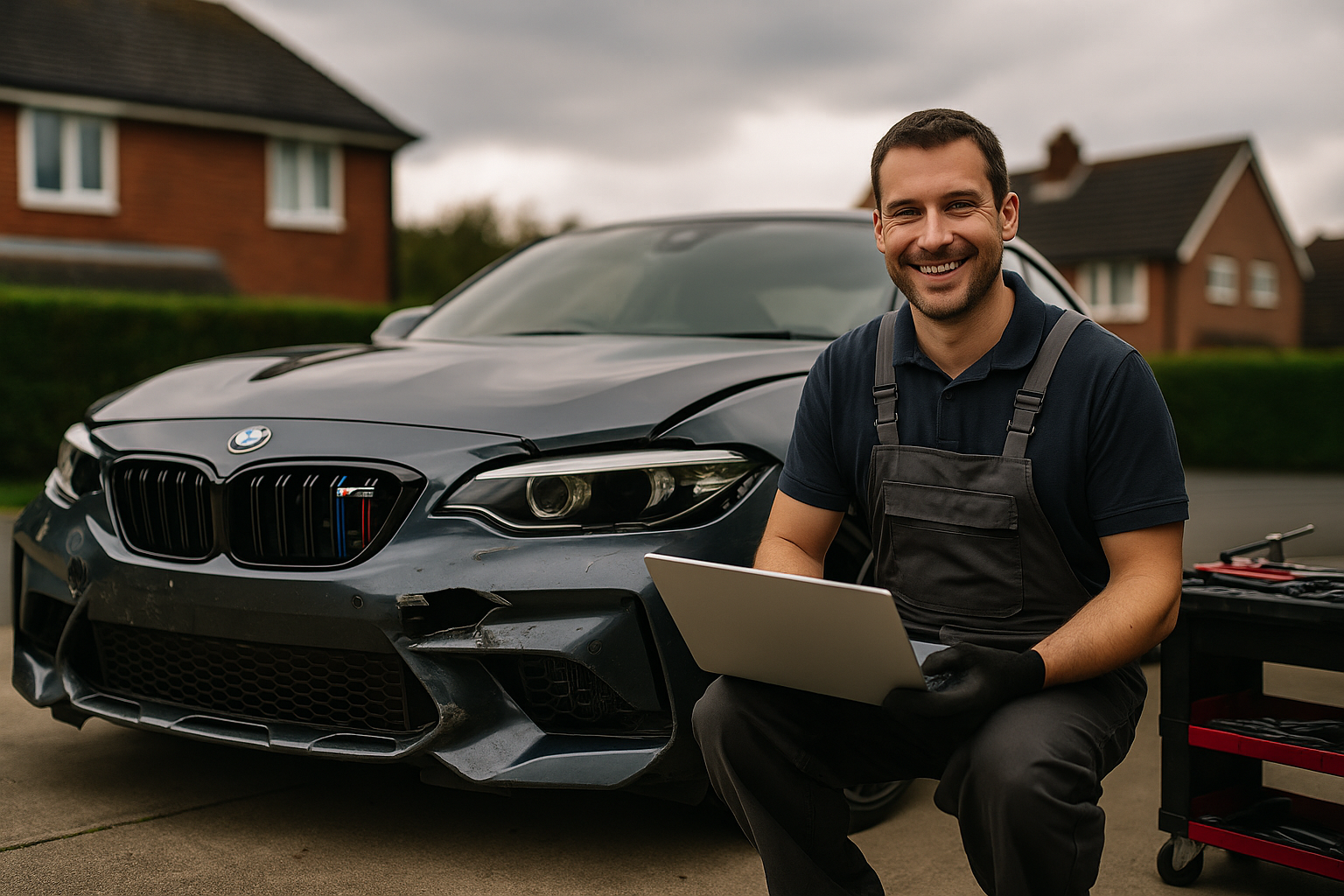Damaged Doesn’t Mean Done: Why Repaired Cars Are on the Rise in 2025
Adam Mir
Author
4 min read
12 July 2025

Damaged Doesn’t Mean Done: Why Repaired Cars Are on the Rise in 2025
In 2025, the UK’s car market is evolving — and fast. A growing number of buyers, sellers, and dealers are challenging the idea that a damaged vehicle is destined for the scrapyard. Once discarded, written-off or faulty cars are now being viewed as valuable opportunities.
The message is clear: damaged doesn’t mean done.
At the heart of this movement is a booming market for repaired and repairable vehicles — and it’s changing how we think about ownership, sustainability, and profit.
⸻
1. A Changing Perception of “Value”
In the past, a car with crash damage, a failed MOT, or an electrical issue might have meant the end. But today’s buyers — especially younger, digitally-savvy enthusiasts — see value where others don’t.
A car with a failed gearbox?
A project that needs cosmetic TLC?
For thousands of buyers, that’s not a problem — it’s a project.
Repaired vehicles are no longer just a budget option; they’re becoming smart investments, driven by rising costs of new cars, inflation, and better access to automotive knowledge online.
⸻
2. Rebuilders & Influencers Are Changing the Game
Platforms like YouTube and TikTok have turned everyday mechanics into public figures. Content creators like Matt Armstrong, Joe James, Chris Slix, and Salvage Rebuilds UK have showcased the thrill and satisfaction of rebuilding write-offs into high-performance machines or daily drivers.
The impact?
• 🚗 More people are inspired to buy damaged vehicles
• 🔧 The stigma around salvage cars is fading
• 💰 Buyers see the value gain from repair-to-resell models
These creators have helped normalize the idea that cars can have a “second life” — and platforms like Second Gears are built to power that shift.
⸻
3. Insurance Write-Offs Aren’t Always Damaged Beyond Repair
Many vehicles are written off due to economic thresholds, not the severity of damage. In some cases, a broken bumper, an airbag deployment, or a cracked sensor leads to a write-off because the cost of parts + labour exceeds the insurer’s limit.
This is where opportunity lies.
A car written off due to superficial damage may still be:
• Structurally sound
• Low mileage
• Fully repairable
• A fraction of its market value
This is the exact type of car being snapped up by dealers and rebuilders across the country.
⸻
4. Environmental Benefits & Sustainability
With rising awareness of environmental impact, the idea of repairing instead of replacing has gained huge traction.
Rebuilding cars reduces:
• 🚛 Waste to scrapyards and landfills
• 🏭 Demand for energy-intensive new vehicle production
• 🛠 Pressure on global parts supply chains
It’s a circular economy model: reuse, restore, resell.
⸻
5. How Second Gears Powers This Movement
At Second Gears, we saw a gap in the UK automotive space. While marketplaces for new and “mint” used cars are everywhere, there was no trusted platform to buy and sell imperfect vehicles — until now.
Our platform is:
• 🛠 Built for damaged, repaired, and MOT-failed cars
• 📈 Free to list for sellers
• 🔧 Dealer-focused, with instant offers from buyers who understand the value
• 💬 Community-driven, supporting rebuilders, hobbyists, and auto entrepreneurs
We believe every car has value — even if it’s not showroom perfect.
⸻
Conclusion: Welcome to the Age of the Imperfect Car
2025 marks a turning point: people are no longer afraid to own — or profit from — a damaged or repaired vehicle. Whether you’re selling a non-runner, looking for your next flip project, or trying to find affordable stock as a dealer, this space is growing fast.
With platforms like Second Gears, the process is finally becoming streamlined, trusted, and community-led.
🚗 Because damaged doesn’t mean done.
In 2025, the UK’s car market is evolving — and fast. A growing number of buyers, sellers, and dealers are challenging the idea that a damaged vehicle is destined for the scrapyard. Once discarded, written-off or faulty cars are now being viewed as valuable opportunities.
The message is clear: damaged doesn’t mean done.
At the heart of this movement is a booming market for repaired and repairable vehicles — and it’s changing how we think about ownership, sustainability, and profit.
⸻
1. A Changing Perception of “Value”
In the past, a car with crash damage, a failed MOT, or an electrical issue might have meant the end. But today’s buyers — especially younger, digitally-savvy enthusiasts — see value where others don’t.
A car with a failed gearbox?
A project that needs cosmetic TLC?
For thousands of buyers, that’s not a problem — it’s a project.
Repaired vehicles are no longer just a budget option; they’re becoming smart investments, driven by rising costs of new cars, inflation, and better access to automotive knowledge online.
⸻
2. Rebuilders & Influencers Are Changing the Game
Platforms like YouTube and TikTok have turned everyday mechanics into public figures. Content creators like Matt Armstrong, Joe James, Chris Slix, and Salvage Rebuilds UK have showcased the thrill and satisfaction of rebuilding write-offs into high-performance machines or daily drivers.
The impact?
• 🚗 More people are inspired to buy damaged vehicles
• 🔧 The stigma around salvage cars is fading
• 💰 Buyers see the value gain from repair-to-resell models
These creators have helped normalize the idea that cars can have a “second life” — and platforms like Second Gears are built to power that shift.
⸻
3. Insurance Write-Offs Aren’t Always Damaged Beyond Repair
Many vehicles are written off due to economic thresholds, not the severity of damage. In some cases, a broken bumper, an airbag deployment, or a cracked sensor leads to a write-off because the cost of parts + labour exceeds the insurer’s limit.
This is where opportunity lies.
A car written off due to superficial damage may still be:
• Structurally sound
• Low mileage
• Fully repairable
• A fraction of its market value
This is the exact type of car being snapped up by dealers and rebuilders across the country.
⸻
4. Environmental Benefits & Sustainability
With rising awareness of environmental impact, the idea of repairing instead of replacing has gained huge traction.
Rebuilding cars reduces:
• 🚛 Waste to scrapyards and landfills
• 🏭 Demand for energy-intensive new vehicle production
• 🛠 Pressure on global parts supply chains
It’s a circular economy model: reuse, restore, resell.
⸻
5. How Second Gears Powers This Movement
At Second Gears, we saw a gap in the UK automotive space. While marketplaces for new and “mint” used cars are everywhere, there was no trusted platform to buy and sell imperfect vehicles — until now.
Our platform is:
• 🛠 Built for damaged, repaired, and MOT-failed cars
• 📈 Free to list for sellers
• 🔧 Dealer-focused, with instant offers from buyers who understand the value
• 💬 Community-driven, supporting rebuilders, hobbyists, and auto entrepreneurs
We believe every car has value — even if it’s not showroom perfect.
⸻
Conclusion: Welcome to the Age of the Imperfect Car
2025 marks a turning point: people are no longer afraid to own — or profit from — a damaged or repaired vehicle. Whether you’re selling a non-runner, looking for your next flip project, or trying to find affordable stock as a dealer, this space is growing fast.
With platforms like Second Gears, the process is finally becoming streamlined, trusted, and community-led.
🚗 Because damaged doesn’t mean done.

